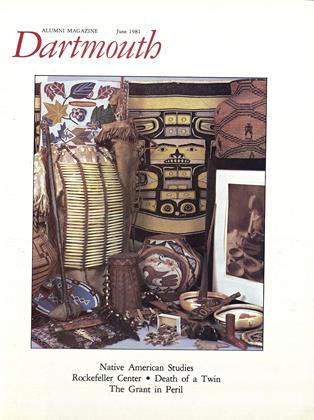Dartmouth has always been blessed with the services and affections of men who loved to fish. One of them, professor of history Kenneth Shewmaker, editor of the diplomatic papers of Daniel Webster, has managed to achieve the unlikely pairing of scholarship with the telling of one of America's most venerable fish stories. Shewmaker is the author of "Daniel Webster and the Great Brook Trout," recently published (along with its 20 footnotes) in The American Fly Fisher.
The fruit of two months of Saturdaymorning, out-of-season research in Baker Library's Webster Collection, the article examines the tale of how Daniel Webster, Martin Van Buren, and Philip Hone (mayor of New York City from 1825 to 1827) came to Brookhaven (then called Fire Place), Long Island, for a fishing expedition on the Carmans River sometime in the spring of 1827 and left with a 14-anda-half-pound monster of a brook trout destined for consumption at Delmonico's.
Webster and Hone, tippling in Samuel Carman's tavern, heard that the trout of trouts had been seen in a nearby millpond. They fished for it unsuccessfully all day Saturday and, according to the story, consoled themselves by drinking too much rum Saturday night. Sunday morning in church, after the congregation sang "Shall we gather at the river, the beautiful, beautiful river," one of Carman's servants tiptoed in and whispered the news that the fabulous fish had been spotted again. Webster, Hone, and Carman discreetly left their pew, followed, one by one, by the other members of the congregation (and finally the parson), who all "gathered at the river to watch the ensuing battle between a great man and a great fish."
According to Shewmaker's careful retelling of the story, "Webster first caught a small brookie, which he gently released unharmed. About half an hour later, however, the big fish was hooked. The cast was long, the fly landed daintily, the strike was ferocious, the battle was nearly as protracted as Reverend King's sermon, and the memorable words were uttered by Carman's servant: 'We hab you now, Sar!' What they allegedly had was a world record-breaking 14 1/2 pound leviathan."
Shewmaker the sportsman would have liked to leave it at that. "Being a Webster scholar, as well as a fly fisherman, I dearly hoped the story was true," he wrote. But the historian in him, after extensive research, was compelled to puncture previous accounts of the incident with charges of "careless and slipshod scholarship." He claims the story is "built on foundations of sand."
In his scrutiny of Webster's, Hone's, and Van Buren's correspondence and diaries, Shewmaker found no mention of such a substantial trout, although accounts are provided of other fishing episodes. After examining all the available evidence, and after dismissing the possibility that political rivals Webster and Van Buren would ever have gone fishing together, he concludes that the story is "apocryphal."
Shewmaker is reluctant, however, to detract too much from his man's accomplishments with a fly rod. "Webster certainly was a fly fisherman," he points out, "and a good one at that. For example, in June of 1825 he took, by his own account, '26 trouts' " from the Mashpee River on Cape Cod. "He also has the familiar experience of losing the big one, which broke his line. Recalling that fine outing on the Mashpee, Webster stated that he had never 'had so agreeable a days fishing,' nor did he 'ever expect" such another.' Fortunately, he did have many other good days on the Mashpee and other trout streams."
If Webster had indeed caught the famous 14-and-a-half-pound brook trout, Shewmaker maintains, he would have recorded the accomplishment in at least one of his many letters. Unable to find any such solid evidence, Shewmaker reluctantly admits "that the tale is what some people call a 'fish story,' which, I think, means a story too good to be true." What is true about fishing and politicians, Shew- maker has observed, is that the United States "never went to war when a fly fisherman was president."
Tuck professor John Hennessey's umbrellabears a legend: "Failure Is Impossible."
 View Full Issue
View Full Issue
More From This Issue
-
 Feature
FeatureDeath and Reunion: the loss of a twin
June 1981 By George L. Engel -
 Cover Story
Cover StoryThe Long-Deferred Promise
June 1981 By Shelby Grantham -
 Feature
FeatureRockefeller Center: the ideal of reflection and action
June 1981 By Donald McNemar -
 Feature
FeatureA Dull Little Bug Imperils the College Grant
June 1981 By Ted Winterer -
 Article
ArticleDartmouth Authors
June 1981 -
 Article
ArticleThe National Committee
June 1981








